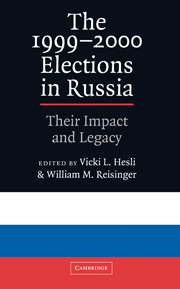29 results
The Politics of Energy Dependency: Ukraine, Belarus, and Lithuania between Domestic Oligarchs and Russian Pressure. By Margarita M. Balmaceda. Studies in Comparative Political Economy and Public Policy. Toronto: University of Toronto Press, 2013. xvi, 444pp. Notes. Bibliography. Chronology. Index. Figures. Tables. Maps. $90.00, hard bound.
-
- Journal:
- Slavic Review / Volume 73 / Issue 3 / Fall 2014
- Published online by Cambridge University Press:
- 20 January 2017, pp. 656-657
- Print publication:
- Fall 2014
-
- Article
- Export citation
Legislative Politics and Economic Power in Russia. By Paul Chaisty. St Antony's Series. New York: Palgrave MacMillan, 2006. xvii, 240 pp. Appendixes. Notes. Bibliography. Glossary. Index. Figures. Tables. $74.95, hard bound.
-
- Journal:
- Slavic Review / Volume 66 / Issue 4 / Winter 2007
- Published online by Cambridge University Press:
- 27 January 2017, pp. 787-788
- Print publication:
- Winter 2007
-
- Article
- Export citation
SECTION V - CONCLUSION
-
- Book:
- The 1999–2000 Elections in Russia
- Published online:
- 23 October 2009
- Print publication:
- 18 August 2003, pp 259-260
-
- Chapter
- Export citation
SECTION IV - PARTIES AND INSTITUTIONS
-
- Book:
- The 1999–2000 Elections in Russia
- Published online:
- 23 October 2009
- Print publication:
- 18 August 2003, pp 161-162
-
- Chapter
- Export citation
Frontmatter
-
- Book:
- The 1999–2000 Elections in Russia
- Published online:
- 23 October 2009
- Print publication:
- 18 August 2003, pp i-iv
-
- Chapter
- Export citation
SECTION I - INTRODUCTION
-
- Book:
- The 1999–2000 Elections in Russia
- Published online:
- 23 October 2009
- Print publication:
- 18 August 2003, pp 1-2
-
- Chapter
- Export citation
SECTION III - THE ROLE OF REGIONAL POWER
-
- Book:
- The 1999–2000 Elections in Russia
- Published online:
- 23 October 2009
- Print publication:
- 18 August 2003, pp 119-120
-
- Chapter
- Export citation
Acknowledgment
-
- Book:
- The 1999–2000 Elections in Russia
- Published online:
- 23 October 2009
- Print publication:
- 18 August 2003, pp ix-xii
-
- Chapter
- Export citation
Contributors
-
- Book:
- The 1999–2000 Elections in Russia
- Published online:
- 23 October 2009
- Print publication:
- 18 August 2003, pp vii-viii
-
- Chapter
- Export citation
Contents
-
- Book:
- The 1999–2000 Elections in Russia
- Published online:
- 23 October 2009
- Print publication:
- 18 August 2003, pp v-vi
-
- Chapter
- Export citation
12 - The 1999–2000 Elections and Russia's Prospects for Democracy
-
-
- Book:
- The 1999–2000 Elections in Russia
- Published online:
- 23 October 2009
- Print publication:
- 18 August 2003, pp 261-274
-
- Chapter
- Export citation

The 1999–2000 Elections in Russia
- Their Impact and Legacy
-
- Published online:
- 23 October 2009
- Print publication:
- 18 August 2003
Bibliography
-
- Book:
- The 1999–2000 Elections in Russia
- Published online:
- 23 October 2009
- Print publication:
- 18 August 2003, pp 275-298
-
- Chapter
- Export citation
SECTION II - PARTIES IN THE ELECTORATE
-
- Book:
- The 1999–2000 Elections in Russia
- Published online:
- 23 October 2009
- Print publication:
- 18 August 2003, pp 27-28
-
- Chapter
- Export citation
Index
-
- Book:
- The 1999–2000 Elections in Russia
- Published online:
- 23 October 2009
- Print publication:
- 18 August 2003, pp 299-302
-
- Chapter
- Export citation
The Legacy of State Socialism and the Future of Transformation. Ed. David Lane. Lanham, Md.: Rowman and Litdefield, 2002. viii, 247 pp. Notes. Index. Figures. Tables. $72.00, hard bound. $26.95, paper.
-
- Journal:
- Slavic Review / Volume 62 / Issue 2 / Summer 2003
- Published online by Cambridge University Press:
- 27 January 2017, pp. 400-401
- Print publication:
- Summer 2003
-
- Article
- Export citation
Explaining Electoral Competition across Russia's Regions
-
- Journal:
- Slavic Review / Volume 62 / Issue 2 / Summer 2003
- Published online by Cambridge University Press:
- 27 January 2017, pp. 278-301
- Print publication:
- Summer 2003
-
- Article
- Export citation
Local Heroes: The Political Economy of Russian Regional Governance. By Kathryn Stoner-Weiss. Princeton, NJ: Princeton University Press, 1997. 227p. $40.00.
-
- Journal:
- American Political Science Review / Volume 93 / Issue 3 / September 1999
- Published online by Cambridge University Press:
- 01 August 2014, p. 739
- Print publication:
- September 1999
-
- Article
- Export citation
Conceptions of Democracy Among Mass and Elite in Post-Soviet Societies
-
- Journal:
- British Journal of Political Science / Volume 27 / Issue 2 / April 1997
- Published online by Cambridge University Press:
- 01 April 1997, pp. 157-190
- Print publication:
- April 1997
-
- Article
- Export citation
From Perestroika to Privatisation: The Politics of Property Change in Russian Society, 1985-1991. By Cox Terry. Aldershot, Eng.: Avebury, 1996. vi, 158pp. Bibliography. Index. $51.95, hard bound.
-
- Journal:
- Slavic Review / Volume 56 / Issue 1 / Spring 1997
- Published online by Cambridge University Press:
- 27 January 2017, pp. 158-159
- Print publication:
- Spring 1997
-
- Article
- Export citation



